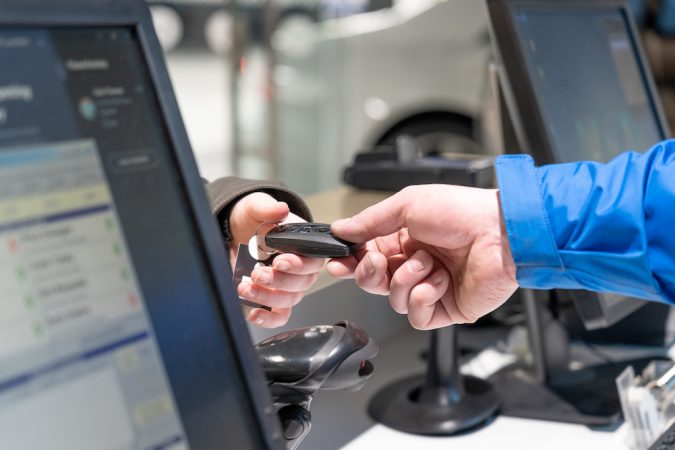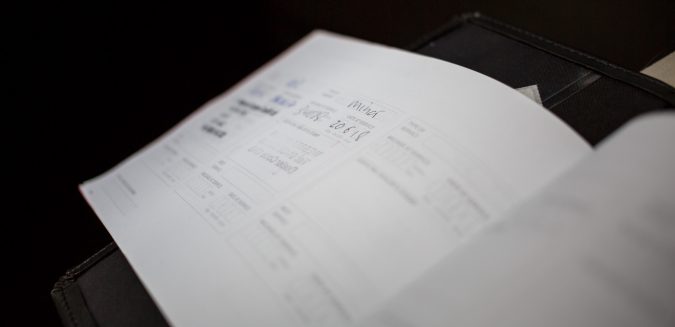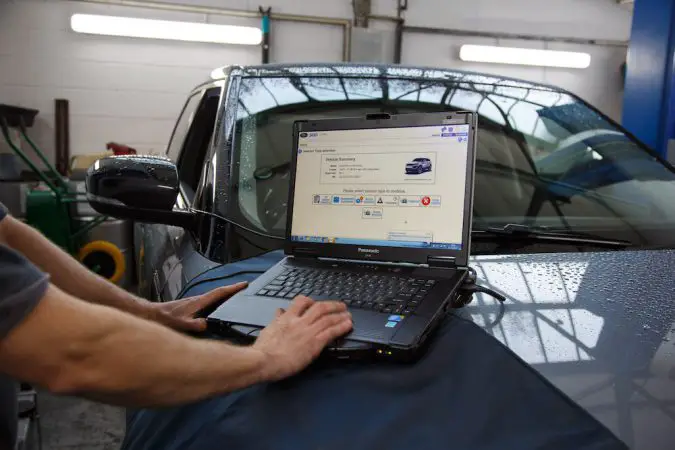Car ownership is no doubt a tricky balance to manage. Between running costs, trying to keep it clean, caring for its needs, or sorting out servicing and repairs down the line, it’s a chore and a half. Worst of all are the mountains of paperwork that come with it. Service records, registration papers, insurance, or even your title number. Each one is required to certify your ownership of a car, or maybe to pass it on.
Alternatively, you’ll also need these papers for subscribing to insurance plans or getting a loan from the banks. No matter how important they may be, however, there’ll be occasions when forgetfulness can get the better of us. For instance, having lost your title number. That’s quite a serious issue since everything that ties your ownership of that vehicle is reliant on it. So, here’s what to do if you lose it…
- What Is It?
- How Does It Work?
- Title v. Registration v. VIN
- Moving Between States
- Selling/Trading Your Car
- Types Of Titles
- How To Find It?
- Get A New One
- Final Thoughts
What Is A Car’s Title Number?
A vehicle title number can be referred to as the ‘certificate of title’, or more popularly known in street racing culture, the ‘pink slip’. Essentially, it functions as documentation proving that you are the legal and valid owner of a particular vehicle. Alongside that, the title also identifies a few key details about the car in question. In general, the sort of information included in your car’s title may include:
- Your (the owner’s) name
- Vehicle Identification Number (17-digit VIN)
- Odometer reading the last time it was sold (useful when buying or selling used cars)
- Sticker price when bought new
- Weight class (GVWR; gross vehicle weight rating)
- Lienholder details for cars that were purchased on finance (bank, dealer, etc.)
- Title assignment information (ownership changes including buyer and seller names, addresses, date of sale, and signatures)
- Vehicle information, such as its make and model, as well as model year
- License plate number
What all that being said, the title is a crucial piece of document that is required for vehicle ownership. If the car is owned by you, or in other words, purchased outright, the title number will be under your name. Should the vehicle be purchased with either bank or dealer financing packages, then the name of the lienholder will appear on the title, as well. Without a title, you can’t prove who’s the owner.
Hence, why you’ll also need the title number when it comes time to transfer the possession of said car onto someone else. Be it an inheritance, or if you choose to sell your car. In addition, you’ll require the title for things such as registering your car to be driven or getting insurance on it. The title is typically issued by the local state DMV (Department of Motor Vehicles) where you purchased the car.
How Does Your Car’s Title Number Work?
Given that the title records details of a vehicle’s ownership, having it around can be quite valuable (or is otherwise legally necessary to have) for several different scenarios. These may include matters such as:
- Theft – Your vehicle’s been stolen, and you wish to report the theft to the authorities. Or, are in the process of reclaiming a stolen vehicle, claiming insurance on it, and so on.
- Buying Or Selling – As you’re either passing on or are accepting of a vehicle’s ownership, the title has to change hands, too.
- Impounded – You’d like to reacquire your impounded vehicle, but the authorities will need some proof of ownership before they let it go. The same applies to repossessed vehicles.
- History – You’re keen to inspect the vehicle’s (and past owner’s) history. Maybe, you’re wanting to double-check any damage, or whether it’s been involved with crimes before buying a used car.
When you’re buying a vehicle, the title number and documentation are commonly handled by the car dealership. This includes getting you the registration and license plates. Typically, this may come at a fee, although for private purchases, you’ll have to handle this yourself. As we discussed before, your title certificate will be withheld by the lienholder. Or in layman’s terms, the party granting you a loan.
This could be a bank, or the dealership if you took up a financing deal from them. The concept here is that your title will be held by them until the entire loan is paid off. Ensuring, of course, that all debts around the car are settled. In some situations though, you’ll still be able to keep the title personally. But, the lender’s details are listed down as the actual owner of the vehicle in the title.
Title Number Vs. Registration Vs. VIN… What’s The Difference?
It’s easy to get these three confused, as your car’s title number, registration, and VIN are all a part of vehicle ownership. Anytime you’re buying or selling a car, getting it insured, having a financing deal put on it, these three will get involved. On top of that, it’s fairly easy to get them mixed up. Here’s a quick summary of what each one does, and why they matter:
- Title (And Its Title Number) – Legal document certifying and validating proof of ownership over any vehicle.
- Registration – Certificate permitting that a particular vehicle may be driven on public roads. Without registration, your car can’t be driven on the street, and you can be fined if caught. Hence, why certain types of vehicles, such as non-road legal race cars, don’t have registration papers for them.
- VIN – Or ‘Vehicle Identification Number’, this sequence of characters is similar in appearance to your title. However, while the title proves your ownership over a vehicle, the VIN certifies that it was built. It’s sort of a birth certificate for your car, with the VIN stamped onto the car from the factory.
On that last note, there’s another crucial difference between your title and a car’s VIN. A vehicle’s VIN is fixed and can’t be changed, regardless of ownership changes. Every road-legal vehicle has a VIN, as it will carry it forever. Nevertheless, a title number isn’t constant, despite sharing a unique multi-digit character sequence. When your vehicle changes owners, they’ll get a different title number.
What Happens To Your Title Number As You Move Between States?
Unlike most other countries, individual states in the US are granted rather a lot of autonomy when it comes to registering and managing vehicles. As we’ve highlighted earlier, each state has its own DMV that issues title numbers. Alternatively, you may also get the title number from your state’s local Secretary of State. In addition, the title numbers vary from one state to another.
What this means, in basic terms, is that the sequencing of the title number will differ between states. Some states have shorter title numbers, just 7 digits in length. Others, meanwhile, could have up to 17 digits in the title number. You can use this handy guide from the NMVTIS to learn more. On top of that, each state also has varying processes that need to happen while applying for the title number.
Therefore, and just like your license number (among others), moving away to a different state will see you having to re-register for a new title. To be specific, it entails you transferring the title format and style from the old state to the new one. Subsequently, you’ll need to get over to your new state DMV and prepare the necessary documents, like license plates, registration, address, and so on.
Be wary, as some states may request additional information and lay more red tape before the titling process could be completed. For example, some states ask that a notary be present to confirm all the details before a title is verified. Most others, meanwhile, only need notarization during the buying or selling of a vehicle. In short, one state’s title number and titling process may differ from another.
How Does The Title Number Affect Selling Or Trading Your Car?
As selling or trading in your car entails a change of ownership, this means that the title number will play a key role in the process. The title, after all, already has room to accommodate information that records ownership changes, and it’s a permanent fixture that can’t be altered. As a change in the car’s ownership, the current owner (seller) and the would-be owner (buyer) will have to provide details.
Ultimately, it’s the buyer that will have to do most of the work with getting a brand new title under their name from the state DMV. In addition, most states require a bill of sale to be written by the past owner, thus approving the change in ownership. The new, incoming owner will then have to provide their signature on the bill of sale. That, of course, comes after the buyer’s confirmed all the details.
A bill of sale is a simply written letter, sort of a contract, between the seller and buyer. Generally, a bill of sale should include:
- Date of the purchase or change in ownership
- Location of said purchase, including the city or town and state
- Description of the vehicle, such as make and model, as well as a brief highlight of its specifications
- Names and addresses of both parties, buyer and seller
- Signatures of both the buyer and seller, validating the bill of sale
What Are The Different Types Of Car Titles?
A title (and its title number) don’t just record a vehicle’s ownership, mind you. It’s also a way for you to see the condition of the vehicle, and its wellbeing. As such, you’ll find that there are varying types of titles attached to most vehicles. When the car’s status changes, you’ll get issued with a new title accordingly. These two are the most common ones, and shouldn’t alarm you:
- Clean – Having a clean title denotes that your car hasn’t been in any major accidents or suffered any serious damage. To be more specific, these are damages where an insurance company would deem to be totaled. “Totalled” or ‘total loss’ refers to when the damage sustained is so significant, it may cost more than (or too much, percentage-wise, of) the vehicle’s worth to get it fixed.
- Clear – Similar to a clean title, but as the name suggests, a clear title is issued to owners that have no liens or loans against the vehicle. That is to say, its current possessor owns the vehicle outright, free of any debt.
Besides clean or clear titles, other types of titles can be issued to cars that have undergone damage or were compromised in any way. If you’re buying a car with these titles, do be diligent about checking over their condition. Additionally, consider the fact that cars with these titles may be cheaper to buy owing to their condition. The caveat, however, is that it may cost you more to insure them…
1. Damaged, Stolen, Compromised Cars (But Still Fixable)
- Salvage – So, what happens when the insurance company does declare that your car is a total loss? In that case, your clean or clear title is converted into a salvage title. With this in hand, the authorities have declared that this totaled vehicle may not be sold or driven whatsoever in its present condition.
- Rebuilt (Or Reconstructed) – Should someone undertake steps to mend said totaled vehicle, they can then be issued a rebuilt title once the job’s completed satisfactorily. In this regard, the same vehicle has been declared to be safe to be driven following its repairs. Note, mind you, that rebuilt titles can still be issued to cheaper and simpler repair jobs that might require more patching up later on.
- Flood Or Water Damage – Severe water damage to your car can occur during flooding, thunderstorms, or any other scenario where much of the vehicle is submerged. This much water will undoubtedly see substantial damage be done to your car’s electronics and mechanical components. For instance, the engine, transmission, wiring, and more. That’s not to mention high chances of corrosion.
It should also be noted that the threshold for a salvage title differs between states. When it comes to damage, it may be issued if it’s deemed that the repair value is worth 60% of more of the vehicle’s market value. Furthermore, salvage titles may also be granted to cars that have been stolen. In all, cars with these titles need some fixing or reconditioning, but they may return to the road.
2. Heavily Damaged Cars That May Have To Be Scrapped
- Lemon – Under state lemon laws, a vehicle may be branded a “lemon” if it’s proven to be unreliable or unsafe to drive. Typically, you’ll find this on cars that have far too many dysfunctional components. It may merely impact your driving experience, but could sometimes be a hazard to you and others. Cars carrying lemon titles do still have the chance to be fixed and have that lemon title removed.
- Junk Or Dismantled – But let’s say that the damage done (e.g. during an accident) to your vehicle is quite heavy, costing 75% or more of its value to fix. In this case, your car may carry a junk or dismantled title. These vehicles can no longer be roadworthy or are unfixable. As a result, the vehicle may be scrapped altogether. Or, have its workable components be salvaged and used for spare parts.
- Destruction – A certificate of destruction is commonly issued by the insurance company when they’re taking ownership or repossession of a vehicle. In this case, they’re approving that this vehicle can’t be road-legal anymore, and wants it destroyed. Sometimes, the car itself may be in a repairable shape. However, perhaps due to hidden flaws in its compromised condition, destroying it might be safer.
Where And How Can You Find The Title Number?
If you need to check your title number, it may appear in a few places. Most notably, these digits could be found in the actual title certificate itself, registration papers, or registration renewal. With that in mind, it’s not uncommon for owners to lose these papers. It might’ve been lost to the passage of time, was destroyed or accidentally discarded, or has been stolen. So, what do you do now?
You’ll now have to find out how to get the title back. In that case, don’t worry, as a vehicle’s title and title number are replaceable should incidents as these occur. If you’ve noticed that your vehicle’s title number is missing or can’t be found, there are 3 places where you can ask to get it back:
- Lienholder – Since getting a car through a loan doesn’t consider you as the rightful owner just yet, the lienholder may carry the title. If you’ve lost the title number on your end, you may contact the lender to find the title certificate for you.
- Department Of Motor Vehicles – Every vehicle registered on public roads will have to go through your local DMV database. With their stamp of approval needed, they’ll also keep all records pertaining to a car’s ownership, information, and so on. This includes the title and title number.
- Insurance – Your car’s insurance provider may not necessarily have the title information or your title number. But as a part of their due diligence in keeping track of its condition and ownership, some may have the title details on hand and could help you.
How Can You Get A New Title?
The good news here is that finding the title number can be fairly painless these days. All it takes is a phone call to your local DMV or lienholder, and they’ll be able to entertain you promptly. Otherwise, know that some states don’t even use paper-based titles anymore, as they’re moving to keep all that information online. Thus, you could log into your local DMV website, and find the electronic title.
Having now understood how to find the title number, you’ll now have to get a new certificate done up if it’s gone missing. Your only option is, once again, to head over to the state DMV’s offices and apply for a duplicate title. Should walk-in options not be suitable, some DMVs offer these services by phone, email, or using their online portals. Applying for a duplicate title will require some documentation.
To confirm your identity and verify your request, you’ll likely need:
- Driver’s license and other personal identification (social security, ID, etc.)
- Registration documents
- Loan and lienholder information (if you bought your car on finance)
- Insurance paperwork
- Details of the vehicle (VIN, make and model, model year, etc.)
- Bill of sale (as a complementary piece of evidence, but not entirely necessary)
With all of these documents, you can begin the application. Although, this won’t be free. In general, the fee shouldn’t cost more than $20 for most states. Once your payment’s been made, the new title will be processed, and the DMV will have it ready. If you’re attending the DMV in person, you may be able to get the new title on the same day. By mail, it can take as long as 15 to 30 days for it to arrive.
Title Numbers and Car Titles: Need-to-Know Facts
- A car title is a legal document that proves ownership of a car and contains important information needed to register, insure, and sell a car.
- A title number is a unique multi-digit sequence stamped on the car title, usually seven or eight characters long, and is helpful when finding a missing title or getting a new one.
- Unlike the Vehicle Identification Number (VIN), the title number is not fixed, and it changes when the car changes owners.
- The title number is necessary when applying for a lien or insurance and is used by the government to keep track of a car’s ownership and life.
- The DMV (Department of Motor Vehicles) is the first place to check for a lost title number as they may have the information available online or can send it by mail.
- If the car was bought through a lienholder, they may have the title number, especially if the car is not fully paid off.
- Once a physical or electronic copy of the car title is obtained, finding the title number should be easy, usually located in the top left corner next to the VIN.
- Applying for a new car title is necessary if the original one is lost, and the process can be done through the DMV either in person, by phone, email, or online.
- Bringing proper identification, registration forms, and insurance is necessary when applying for a new car title.
- Applying for a new car title as soon as possible is crucial to avoid fines.
Final Thoughts On Your Car’s Title Numbers
And there you have it… Some neat tips and tricks around your car’s title number. What it means, why it matters, and all the business that goes around it. More importantly, you’re now well equipped with information on what to do if you happen to lose the title or title number. This isn’t likely to be an issue that’ll trouble you much these days, as most states are storing your title certificates online.
So, even if you lose the physical title document, searching for it can be as easy as going to your DMV’s webpage. If you just need to know the number, then a phone call to the DMV or lienholder can supply that for you. In all, don’t fret if something were to happen to your title. Even going as far as having to replace it is quite seamless these days. Just make sure you get it in soon to avoid getting fined.











